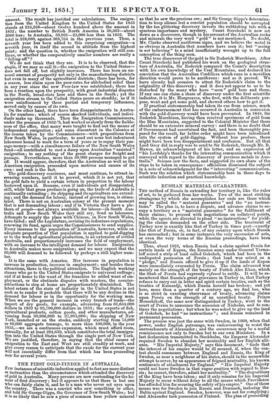THE FIRST GOLD-FINDER IN AUSTRALIA.
FEW instances of scientific induction applied to fact are more distinct or instructive than the circumstances which attended the discovery of gold in Australia. Many persons are now contending for the ho- nour of first discovery ; but it appears to us that there is but one who can fairly claim it, and he is a man who never set eyes upon the country. There was a convict who saw something or other, and told Sir George Gipps, the Governor of New South Wales ; but it is as likely that he saw a piece of common base yellow mineral
as that he saw the precious ore ; and Sir George Gipps's determina- tion to keep silence lest a convict population should be corrupted by the too glittering discovery invests the rubbishing tale with a spurious importance and mystery. Count Stzrelecki is now set down as a discoverer, though in his account of the Australian rocks and minerals the very word "gold" is not mentioned. No doubt, Mr. Clarke observed auriferous signs, and we believe the metal is so obvious in Australia that numbers have seen it; but "seeing is not believing" to a mind insufficiently wrought up to the full conception of the thing seen.
The true discoverer of thegold is Sir Roderick Murchison. After Count Stzrelecki had published his work on the geological struc- ture of Australia, Sir Roderick compared the Count's description with his own knowledge of the Ural Mountains, and declared his conviction that the Australian Cordillera which runs in a meridian direction would prove to be auriferous : and so it proved. We have already had occasion to attest Sir Roderick's claim to the originality of this discovery ; and it does not appear to us to be disturbed by the many who have " seen " gold here and there. If any one can claim a share of discovery under the first scientific indicator, it is Mr. Hargreaves, who first, with the deliberate pur- pose, went and got some gold, and showed others how to get it. If practical statesmanship had taken its cue from science, much of the embarrassment that has occurred in Australia in connexion with the gold-discovery would have been prevented. In 1848, Sir Roderick Murchison, having then received specimens of gold from the Blue Mountains, suggested to the Colonial Minister that there should be an extensive mineral survey : and there is no doubt that if Government had ascertained the fact, and been thoroughly pre- pared for the result, far better order might have been introduced into the system of gold-digging. Without less produce, there might have been less disappointment and confusion. But all that Lord Grey did in reply was to send to Sir Roderick, through Mr. B. Hawes, an acknowledgment of his letter, and an expression of "his Lordship's thanks for the interesting communication which it conveyed with regard to the discovery of precious metals in Aus- tralia." Science saw the facts, and suggested its own share of the steps to be taken in consequence : officialism dismissed the subject in a note of acknowledgment for the " interesting " communication. Such was the relation which statesmanship bore in those days to scientific induction and practical knowledge.


































 Previous page
Previous page